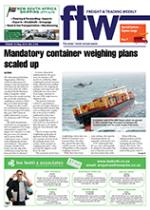The SA airfreight industry
is sitting on the brink of a
major move into e-freight, and
its big money-saving track
into a paperless air cargo
environment.
This follows 15 months of
global development and trials
involving 15 carriers and eight
forwarders, which led, early
last year, to the Iata/Fiata
consultative council (IFCC)
endorsing the multilateral
electronic air waybill (e-AWB)
agreement – and formally
adopting the agreement as
Resolution 672.
In what is described as
“the biggest achievement
in standard-setting in air
freight in 20 years”, the
agreement has paved the way
for the global shift to e-freight,
according to Frederic Leger,
Iata’s head of cargo business
process and standards. He
also noted that Iata hoped it
would act as the springboard
for its ultimate target of 100%
conversion to e-AWB by 2015.
On the local scene, all the
major carriers on the SA
routes and most of the major
freight agents have already
signed
into the
multilateral
e-freight
agreement, the
key to the takeoff
of the new
electronic data interchange
(EDI) system, according to
Alwyn Rautenbach, executive
manager of Airlink Cargo and
chairman of the Air Cargo
Operators’ Committee (Acoc).
“Also, the SA Revenue
Service (Sars) customs systems
are ready for e-freight handling,
so everything is ready to pick
up speed,” he told FTW. “Once
the physical implementation
starts, e-freight in SA will grow
exponentially.”
Rautenbach’s company,
Airlink Cargo, like most
of the other airfreight
operators in SA, has
signed up to the e-AWB
agreement, and is currently
gearing up its in-house
system to become e-freight
compliant.
“Everything in SA is
ready for that big step into
the future of airfreight,”
said Rautenbach.
INSERT & CAPTION
Once the physical
implementation
starts, e-freight
in SA will grow
exponentially from
now on.
– Alwyn Rautenbach

